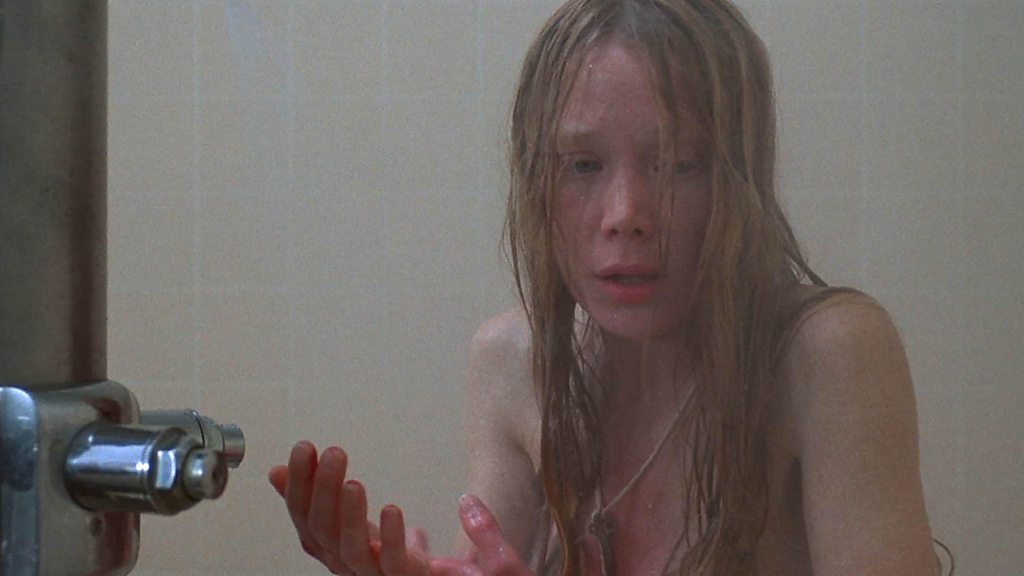
A Malay coming-of-age film about a girl who becomes a monster after her first period has been censored in its home country. It's part of a wider reluctance to show menstruation on screen.
According to the movies, when a young girl gets her period, one of two things might typically happen: she turns into a monster, or she becomes an instant pariah. Carrie (1976), Brian de Palma's adaptation of Stephen King's debut novel, famously begins with naked teenagers pummelling the protagonist with tampons, screaming "Plug it up! Plug it up!", after she is confused and scared by the arrival of her first period while in the communal showers at school. In Ginger Snaps (2000), goth teenager Ginger Fitzgerald's first period attracts the attention of a roaming wolf, whose bite prompts Ginger's transformation into a werewolf.
Outside of horror, which has always trafficked in taboo, Judy Blume's novel Are You There, God? It's Me, Margaret, originally published in 1970, is known by Blume-heads as her "period book". The book chronicles a teenager's anxiety about being the last one in her friend group to get her period, and has frequently been the subject of much ire and bans in schools and libraries in some US states for its frank depiction of menstruation. Pixar's Turning Red (2022) sees academic overachiever Meilin Lee turning into a giant red panda in moments of intense stress or emotion as a metaphor for puberty and menstruation. And now, in Amanda Nell Eu's debut film Tiger Stripes, which is out in the US this weekend, 12-year-old Zaffan becomes a pariah and a monster after she gets her first period.

Young people will often first learn about periods through pop culture, including movies, very special TV episodes, and especially adverts for sanitary products, which only until recently showed an alien-like blue liquid instead of normal, red blood. In the US, it wasn't until 1972 that pads and tampons were even allowed to be advertised on TV, and the word "period" itself was not even used on television until 1985 (a pre-Friends fame Courtney Cox had the honour in a Tampax advert). There is rarely a celebration of periods on screen. At the most, there is a perfunctory explanation. At worst, characters will react with virulent disgust, like in Superbad (2007), when a girl bleeds through her skirt and a male character mimics throwing up. With their lack of candour about menstruation and menarche (the first menstrual cycle), films and TV have continued to fuel the stigma surrounding periods, namely that they are something shameful, "dirty" or "gross", and need to be kept private.
A range of stigma
"There isn't a universal menstrual taboo," points out Dr Bee Hughes, an interdisciplinary artist and researcher and senior lecturer in Media, Culture & Communication, "What you do have is a range of different, sometimes intersecting forms of stigma that manifest in different ways, different places and in different times." In Western culture, there is collective embarrassment around the topic which, at its most extreme, manifests as "period poverty", whereby many women and girls go without period products, either because they can't afford them or because of shame about accessing them, and may skip work or school when they are on their period.
In other places, there are cultural or religious-related restrictions. In Malay, Chinese and Indian cultures, periods are still surrounded by a lot of superstition. Tiger Stripes depicts a very common practice for girls: washing their period pads for fear of leaving any trace of blood. In Chinese culture, a common superstition dictates girls don't throw away their period pads inside the household for fear of inviting bad luck. In India, some Hindu temples have typically excluded women and girls who are menstruating from entering.
While candid period portrayals have been few and far between in mainstream film and TV, horror has always embraced taboo subjects. In the genre, periods are often portrayed as a rite of passage and the start of a transformation – not necessarily a bad one, but a powerful one. Caitlin Grant, creator and host of the Plug it Up! podcast, started her show in 2021 to explore how this trope of "monstrous menstruation" was used in horror films, from Carrie (which inspired the podcast's name) to Excision (2012) and The Witch (2015). "I watched Carrie before I had my first period. That was my introduction and expectation," laughs Grant.

In horror, periods are an efficient storytelling device, quickly pinpointing a transformative moment in a character's life. Carrie, Grant points out, goes from "this scared, meek individual to this force of nature". The film also marked the first time we saw menstrual blood on screen. Even then, horror fans can be squeamish about period blood, as Grant has noticed in the process of covering films that explicitly deal with periods: "For a genre that's so interested in gore and blood, it's so funny to see horror fans freak out when that blood happens to be menstrual."
More like this:
In horror, periods are often treated as a curse, either literally or figuratively. In Ginger Snaps, Ginger (Katherine Isabelle) jokes to her sister Brigitte (Emily Perkins) that her own body is betraying her after she gets her period, which they dub "the Curse". Moments after, she gets bitten by a werewolf and cursed in a different way, intertwining menstruation and monstrousness directly. Even while these horror films are praised as being subversive, they can also fall back into familiar stereotyping, as Grant points out, still doing "the upholding of periods as gross".
A 'baffling' decision
Last year, Tiger Stripes was the first Malay film to be screened at the Cannes Film Festival, where it picked up the Critics' Week Grand Prize. It was also selected to represent Malaysia at the Academy Awards – but only in censored form. The film had several scenes removed by the Malaysian censorship board, including one where period blood is shown on a pad. This decision still baffles Eu, who tells the BBC "you're allowed to have a disembodied head rolling across the village [as happens in Tiger Stripes] but a girl's period blood is still not allowed to be on screen".
Eu's film draws inspiration from Malay folklore as well as its natural landscape and low-budget horror films. After starting her period, Zaffan is banished from her friend group and she starts transforming into a were-tiger. There are no rules or mythology to be followed here ("There's so many different versions of weretigers, so I just created my own version," says Eu); instead the film simply captures the angry confusion of a young girl unsure of what's happening to her or what to do next, and her fear that her school friends could suffer the same fate.

In her preparation for the film, Eu led workshops with girls, and noticed how open conversations occurring between women and girls on the subject of menstruation would often shut down as soon as a man entered the room. After the Malaysian government censored some key scenes from Tiger Stripes without any possibility of appeal. Although that was the version released in Malaysia, Eu publicly disowned the cut version, arguing that "it totally changed the film. The film is trying to push the idea of what shame is". The feedback she received was confusing: the period blood on the pad was cut "because it was considered to be ‘too private' to be shown," she says. "I literally don't know what that means! You allowed [the character] to be peeing in front of the class but this can't be shown?"
Visibility and language are important to combat the sense of shame that has often accompanied periods in pop culture. More recently, menstrual appearances have been making their way into film and TV outside of the horror space. There's Connie the Hormone Monstress on the animated series Big Mouth, who helps girls navigate puberty. In a sex scene in Michaela Coel's I May Destroy You (2020), her character's love interest casually pulls out a tampon and a blood clot out of her. He shows no disgust but rather, curiosity. In the recent film adaptation of Are You There, God? It's Me, Margaret (2023), both Margaret and her mother excitedly celebrate the arrival of her first period. Meanwhile Tiger Stripes configures Zaffan's coming-of-age into something otherworldly, but not scary. Like Carrie, menstruation marks her transformation, but unlike Carrie, this is not into a creature of violence and mayhem, but rather into a more headstrong version of herself. Tiger Stripes uses the visual language of horror films but instead creates a fairytale, one that speaks to the tumultuousness of puberty and doesn't see monstrousness as an inherently bad thing.
Films like Tiger Stripes and Are You There, God? It's Me, Margaret show that there is a way to be gently subversive, to explore the beginning of menstruation as an important, transformative moment, but not one to be feared or disgusted by. Periods no longer need to be the stuff of horror movies.
--
Tiger Stripes is out now in US and UK cinemas
If you liked this story, sign up for The Essential List newsletter – a handpicked selection of features, videos and can't-miss news, delivered to your inbox twice a week.
For more Culture stories from the BBC, follow us on Facebook, X and Instagram.
"still" - Google News
June 15, 2024 at 07:35AM
https://ift.tt/mXIjhuf
Tiger Stripes: The film that shows women's periods are still a taboo - BBC.com
"still" - Google News
https://ift.tt/w4sWoLr
https://ift.tt/8mKuUV0
Bagikan Berita Ini














0 Response to "Tiger Stripes: The film that shows women's periods are still a taboo - BBC.com"
Post a Comment